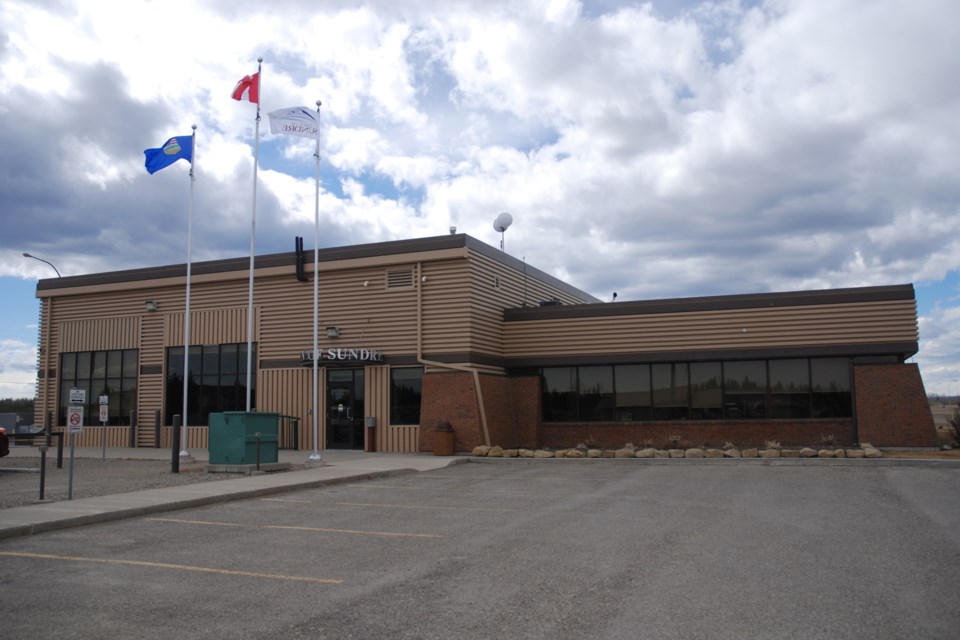SUNDRE – The municipal council recently allocated unused capital funds back into their respective restricted surplus accounts.
Pulling the pertinent information from the municipality’s capital project listing that tracks the status and cost of each item, administration had identified multiple completed projects that still had some leftover funds, council heard during the May 8 meeting.
“This is for the unspent funds on capital projects,” said Chris Albert, director of corporate services. “So, it’s where we’ve had some savings as those projects have been completed.”
When there remains available funding that had been budgeted for a specific capital project, that balance should as a matter of proper accountability be returned to its respective restricted surplus account (RSA), which requires a motion of council, said Albert.
“These are only capital projects that were funded through restricted surplus accounts,” he said, adding five items were identified as needing to be tidied up.
The first was for an all-terrain vehicle utility cart for the Sundre Fire Department that had been budgeted at a total cost of $20,000 with the town and Mountain View County splitting the cost in half. However, Albert said the item has over the past few years been carried over from previous budgets.
“The fire department has looked extensively for something that will fit the bill for what they were hoping to buy,” he said. “They still haven’t managed to find anything.”
So administration recommended cancelling the project for the time being, transferring the town’s $10,000 portion back into the fire department’s RSA.
“And at such a time that the fire department finds something suitable, they’ll bring it forward again to be reviewed by council,” he said.
The second item also pertained to the fire department, which acquired a replacement quad that had been budgeted at $20,000. Because of cost-sharing, Albert said only $4,000 was applicable to the town with the remaining $16,000 coming from the county.
However, a combination of getting a good price on the new quad as well as selling the used unit at a higher-than-expected price at auction resulted in savings of $2,123, he said.
The third project, which had been budgeted at $9,792 for portable toilets, ended up coming in at $7,388, leaving a balance of $2,404 to be transferred back into the municipal lifecycling reserve.
Fourth up was the council chambers upgrade project to install new furniture as well as electronic equipment including multiple cameras at a budget of $120,000, which came in a bit less than forecast at $114,326 leaving $5,674 earmarked to return to the municipal new projects reserve.
The fifth and final project identified by administration was the sweeper unit that had been budgeted at $280,000 but ended up costing $264,907, leaving a difference of $15,093 to return to the municipal lifecycling account.
Following brief discussions on each item, council carried motions as recommended by administration to transfer the unspent funds back into their respective RSAs.
Non-budgeted restricted surplus transfers
Council also heard from Albert that the municipality had a substantial surplus in 2021 worth $535,324 as well as a more modest surplus in 2022 amounting to $184,215 relating to operating expenses, amounting to a total of nearly $720,000.
As a general rule of thumb in accounting, he told council budget variances should ideally be somewhere in the vicinity of five to 10 per cent.
“Over 10 per cent, it’s not usually a good thing,” he said. “I’m happier when it’s closer to five.”
A five per cent variance of the municipality’s $7.9 million budget amounts to about $395,000, he said.
“So, for 2022, we were actually significantly under that five per cent,” he said, adding a number of factors played a role in those surpluses.
In no particular order, he cited unanticipated increased assessment values that generated additional tax revenue in 2021 as well as increased revenue from penalties on unpaid taxes as well as utilities in both 2021 and 2022.
Additionally, he said the substantial increases to interest rates, which have a negative effect on debt, played out favourably for the town because of the amount of cash the municipality has on hand that “created quite a bit of interest revenue for us in 2022.”
Savings also sometimes surface as a result of staff turnover and vacancies in the form of budgeted salaries that went unpaid. And in 2021, provincial grant funding to help municipalities mitigate the impact of COVID also provided a big boost, he said.
Ultimately, council has the final say in how to allocate funds for restricted surplus accounts, but decisions are not necessarily written in stone and can be revised as required in light of emergent matters, he added.
Coun. Todd Dalke said that while he agreed with aspects of administration’s recommended motion, the councillor added that he felt the municipality should also return a portion of the surpluses to taxpayers.
Coun. Paul Isaac asserted that residents don’t necessarily want to receive an annual return payment from municipal surpluses, which instead can be allocated to offset the costs of projects in the future, thereby potentially reducing the need for additional taxation at that time.
“When we do have a savings, we need to use it to benefit our residents on an ongoing basis rather than giving money back, taking money, giving money back, taking money,” said Isaac.
Council carried a motion approving the allocation of cumulative 2021 and 2022 operational surpluses amounting to $719,539 for transfer as follows: $471,038 to general corporate stabilization RSA; $32,688 to Corporate Services Stabilization RSA; $14,077 protective services stabilization RSA; $82,063 to development stabilization RSA; and $119,673 to Community Services Stabilization RSA. Coun. Owen Petersen, whose absence was excused, was not present for the vote. Dalke voted against the motion.



